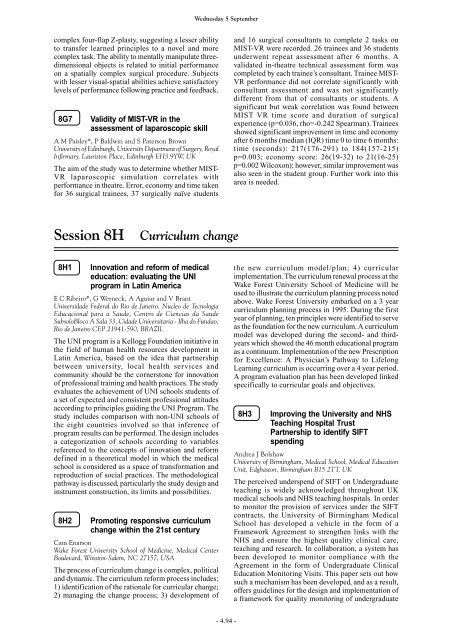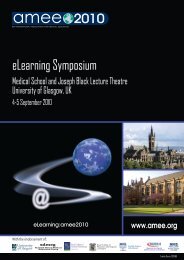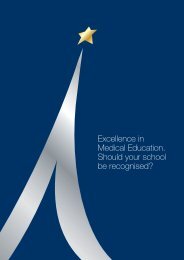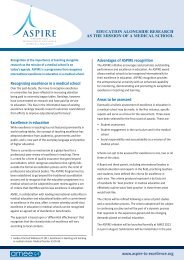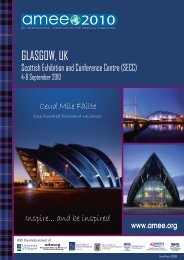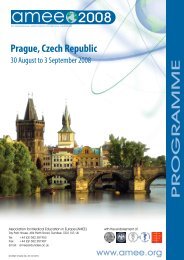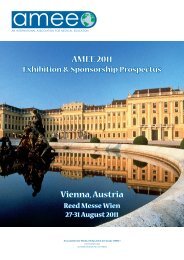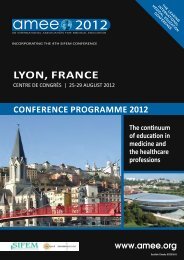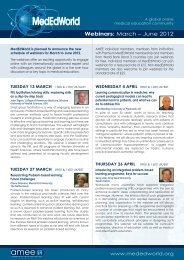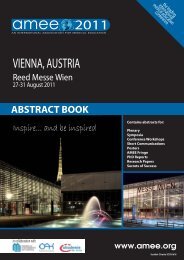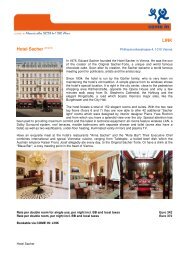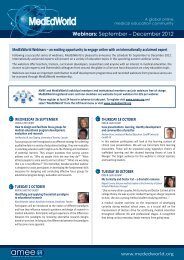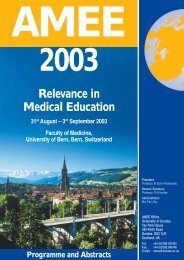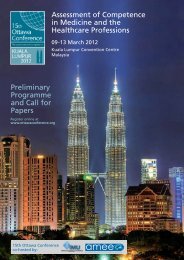AMEE Berlin 2002 Programme
AMEE Berlin 2002 Programme
AMEE Berlin 2002 Programme
You also want an ePaper? Increase the reach of your titles
YUMPU automatically turns print PDFs into web optimized ePapers that Google loves.
complex four-flap Z-plasty, suggesting a lesser ability<br />
to transfer learned principles to a novel and more<br />
complex task. The ability to mentally manipulate threedimensional<br />
objects is related to initial performance<br />
on a spatially complex surgical procedure. Subjects<br />
with lesser visual-spatial abilities achieve satisfactory<br />
levels of performance following practice and feedback.<br />
8G7 Validity of MIST-VR in the<br />
assessment of laparoscopic skill<br />
A M Paisley*, P Baldwin and S Paterson Brown<br />
University of Edinburgh, University Department of Surgery, Royal<br />
Infirmary, Lauriston Place, Edinburgh EH3 9YW, UK<br />
The aim of the study was to determine whether MIST-<br />
VR laparoscopic simulation correlates with<br />
performance in theatre. Error, economy and time taken<br />
for 36 surgical trainees, 37 surgically naïve students<br />
Wednesday 5 September<br />
Session 8H Curriculum change<br />
8H1 Innovation and reform of medical<br />
education: evaluating the UNI<br />
program in Latin America<br />
E C Ribeiro*, G Werneck, A Aguiar and V Brant<br />
Universidade Federal do Rio de Janeiro, Nucleo de Tecnologia<br />
Educacional para a Saude, Centro de Ciencias da Saude<br />
SubsoloBloco A Sala 33, Cidade Universitaria - Ilha do Fundao,<br />
Rio de Janeiro CEP 21941-590, BRAZIL<br />
The UNI program is a Kellogg Foundation initiative in<br />
the field of human health resources development in<br />
Latin America, based on the idea that partnership<br />
between university, local health services and<br />
community should be the cornerstone for innovation<br />
of professional training and health practices. The study<br />
evaluates the achievement of UNI schools students of<br />
a set of expected and consistent professional attitudes<br />
according to principles guiding the UNI Program. The<br />
study includes comparison with non-UNI schools of<br />
the eight countries involved so that inference of<br />
program results can be performed. The design includes<br />
a categorization of schools according to variables<br />
referenced to the concepts of innovation and reform<br />
defined in a theoretical model in which the medical<br />
school is considered as a space of transformation and<br />
reproduction of social practices. The methodological<br />
pathway is discussed, particularly the study design and<br />
instrument construction, its limits and possibilities.<br />
8H2 Promoting responsive curriculum<br />
change within the 21st century<br />
Cam Enarson<br />
Wake Forest University School of Medicine, Medical Center<br />
Boulevard, Winston-Salem, NC 27157, USA<br />
The process of curriculum change is complex, political<br />
and dynamic. The curriculum reform process includes:<br />
1) identification of the rationale for curricular change;<br />
2) managing the change process; 3) development of<br />
- 4.94 -<br />
and 16 surgical consultants to complete 2 tasks on<br />
MIST-VR were recorded. 26 trainees and 36 students<br />
underwent repeat assessment after 6 months. A<br />
validated in-theatre technical assessment form was<br />
completed by each trainee’s consultant. Trainee MIST-<br />
VR performance did not correlate significantly with<br />
consultant assessment and was not significantly<br />
different from that of consultants or students. A<br />
significant but weak correlation was found between<br />
MIST VR time score and duration of surgical<br />
experience (p=0.036, rho=-0.242 Spearman). Trainees<br />
showed significant improvement in time and economy<br />
after 6 months (median (IQR) time 0 to time 6 months:<br />
time (seconds): 217(176-291) to 184(157-215)<br />
p=0.003; economy score: 26(19-32) to 21(16-25)<br />
p=0.002 Wilcoxon); however, similar improvement was<br />
also seen in the student group. Further work into this<br />
area is needed.<br />
the new curriculum model/plan; 4) curricular<br />
implementation. The curriculum renewal process at the<br />
Wake Forest University School of Medicine will be<br />
used to illustrate the curriculum planning process noted<br />
above. Wake Forest University embarked on a 3 year<br />
curriculum planning process in 1995. During the first<br />
year of planning, ten principles were identified to serve<br />
as the foundation for the new curriculum. A curriculum<br />
model was developed during the second- and thirdyears<br />
which showed the 46 month educational program<br />
as a continuum. Implementation of the new Prescription<br />
for Excellence: A Physician’s Pathway to Lifelong<br />
Learning curriculum is occurring over a 4 year period.<br />
A program evaluation plan has been developed linked<br />
specifically to curricular goals and objectives.<br />
8H3 Improving the University and NHS<br />
Teaching Hospital Trust<br />
Partnership to identify SIFT<br />
spending<br />
Andrea J Bolshaw<br />
University of Birmingham, Medical School, Medical Education<br />
Unit, Edgbaston, Birmingham B15 2TT, UK<br />
The perceived underspend of SIFT on Undergraduate<br />
teaching is widely acknowledged throughout UK<br />
medical schools and NHS teaching hospitals. In order<br />
to monitor the provision of services under the SIFT<br />
contracts, the University of Birmingham Medical<br />
School has developed a vehicle in the form of a<br />
Framework Agreement to strengthen links with the<br />
NHS and ensure the highest quality clinical care,<br />
teaching and research. In collaboration, a system has<br />
been developed to monitor compliance with the<br />
Agreement in the form of Undergraduate Clinical<br />
Education Monitoring Visits. This paper sets out how<br />
such a mechanism has been developed, and as a result,<br />
offers guidelines for the design and implementation of<br />
a framework for quality monitoring of undergraduate


